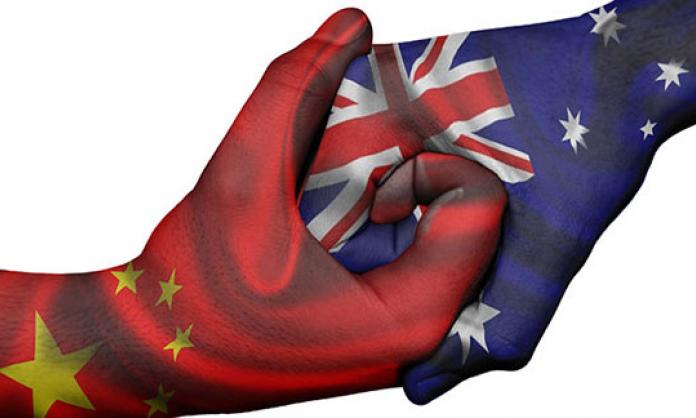Tony Abbott described the signing of the China Australia Free Trade Agreement (ChAFTA) last November as “a decisive moment” in Australia’s economic future. Trade minister Andrew Robb says ChAFTA will net Australian companies billions of dollars in new business.
The government is backed by most of the country’s major business lobby groups, which are mounting a big publicity campaign to promote the agreement.
ChAFTA aims to cut tariffs on a wide range of goods traded between the two countries and to make it easier for Australian companies to sell services to Chinese customers and businesses both from within Australia and in China itself. It also encourages Chinese businesses to invest in operations in Australia.
Given that two-way trade with China is already close to outweighing the combined total of trade with Japan, the US and South Korea, Australia’s next three biggest trading partners, the bosses are licking their lips at the prospect of making big bucks.
“Freedom”
The backers of free trade agreements talk a lot about “freedom”. The Liberal government in particular is all for “freedom” when it comes to trade and investment.
What is this freedom? Nothing but removing limits on the ability of businessmen and women to roam all over the world to set up shop, to exploit workers, to trash the environment and to rip off consumers and governments. But when it comes to working class people – especially those with brown skin – there is only constraint.
And so there’s freedom for Australian businesspeople to open up a factory in Guangdong to employ workers on a pittance and to remit the profits to wealthy shareholders in Australia. But there’s no freedom for those Chinese workers to come and live in Australia permanently.
There’s freedom for wealthy Chinese with $1.5 million in their pockets to buy a visa to live in Australia and to come and go as they please. But none for those who come on boats and without money.
There’s freedom for the bosses to hire and fire at will and to shut down their businesses, throwing thousands onto the dole. But there’s little freedom for workers to strike for their rights.
The rich person’s freedom is the poor person’s prison.
Health care operators like Ramsay Health Care that back ChAFTA aren’t about health or about care. They are about making money.
Dissatisfied with the limits on making money from a population of just 24 million, they are eagerly looking at the Chinese market of more than a billion people. Not just anyone of course – only those who can pay the big bucks they will be charging. Those who don’t have fat bank accounts won’t be getting any “care” from Ramsay Health. They will be left to rot in the substandard hospitals and aged care facilities that are the lot of the majority of the Chinese population.
Banks and insurance companies that extract excessive fees and premiums from Australian customers while endeavouring never to pay out on pensioners’ deposits or insurance claims will, under ChAFTA, now have more opportunities to do the same to Chinese people.
Having made a fortune from mining in Australia, Twiggy Forrest and Gina Rinehart now reckon there’s money to be made from selling beef and dairy products to China, so they are diversifying into food exports. The woman who thinks Australian workers should be prepared to work for $2 a day while herself sitting on a multi-billion dollar fortune is now going to make still more money from selling food to China.
Are we really to believe that all this is good for workers?
Wage cutting
Capitalist freedom extends to the right of bosses to cut workers’ wages. ChAFTA and the related memorandum of understanding (MOU) between the two governments are a threat to pay and employment conditions in Australia.
Recent media exposés have demonstrated the appalling exploitation of overseas workers brought into Australia on temporary visas. Workers in agriculture, mining and construction have been paid as little as $4 an hour, housed in sheds or told to sleep on hard office floors, injured on the job, receiving no compensation, and sexually abused by their supervisors.
When they threaten to report their conditions to the media, government departments or unions, they are threatened with deportation. Government regulations, supposedly meant to ensure fair treatment of these workers, mean nothing because they are rarely enforced and workers are often too scared to complain.
ChAFTA and the MOU will only make this situation worse.
The MOU provides for investment facilitation arrangements (IFA) under which substantially Chinese-owned companies working on infrastructure projects worth more than $150 million will be able to hire Chinese workers on cut price conditions. The projects covered by IFAs are wide ranging and include ports, mines, road building, power stations, agribusiness and telecommunications.
The regulations state that the bosses must comply with all Australian laws and regulations. But this requirement is full of holes. First, these conditions mean only award rates, which are far lower – as much as 30 percent lower – than the going rate in enterprise agreements on big projects.
Second, the employers are able to seek “concessions” from the Department of Immigration and Border Protection.
Third, the MOU is silent on whether these arrangements must be public documents, potentially stopping unions from reviewing them.
Finally, whatever the formal requirement to comply with Australian laws, we know from experience that the bosses will find every way to subvert them. With workers dependent for their continued stay in Australia on the bosses’ say-so, who among them will be brave enough to blow the whistle or stand up for their rights and start organising on the job?
It is not just that these workers will be paid less than the going rate: they will also be at greater risk of industrial injury. ChAFTA waives the mandatory requirement for skills testing and English language proficiency for Chinese workers in a range of occupations, and not just those covered by an IFA. While bosses should be required in such circumstances to provide full instruction and safety warnings in Chinese, this is unlikely to happen, increasing the risk of Chinese workers suffering injury or death on site.
The reality is that ChAFTA will only boost the ranks of Australia’s growing army of insecure “guest workers” ripe for plucking by the bosses.
It is too early to tell whether this provision will lead to the large scale employment in Australia of Chinese labour on cut-rate conditions – but what it certainly does is give the bosses an argument in negotiations with trade unions: give in to our demands or we will use temporary overseas workers instead.
ChAFTA will hurt the working class in other ways. It includes an investor-state dispute settlement (ISDS) clause. This will give Australian or Chinese companies the freedom – there’s that word again – to sue the Chinese or Australian government for any action that either government takes that threatens profits.
Such action includes the imposition of environmental, product safety or labour standards such as minimum staffing ratios or minimum qualification standards.
Tobacco company Phillip Morris has already used the ISDS in the Australia-US FTA to sue the Australian government for the introduction of plain packaging. Similarly, the Chinese government would be prevented by ISDS from enforcing limits on the repatriation of profits by Australian companies operating in China.
ChAFTA must be opposed outright as a threat to the working class, both Australian and Chinese.
Opposing ChAFTA
Disgracefully, the Labor Party supports ChAFTA. Under Rudd and Gillard, the ALP was involved directly in several rounds of its negotiation. Now, as the alternative party of government and anxious to curry support from big business, the party is firmly backing it, promising to wave it through on the floor of parliament when it is tabled in the next few months.
A string of Labor leaders, past and present, including Bob Hawke, Bob Carr, Simon Crean, former president Warren Mundine and a long list of state and territory leaders have urged the party to pass ChAFTA without delay.
The shadow cabinet is trying to play both sides on ChAFTA, Bill Shorten in particular joining in union criticisms of the labour provisions of the MOU while reassuring the bosses that the party will support the agreement itself in parliament and pass it without amendment, making changes only in the enabling legislation. The party leadership wants opportunistically to use the union opposition to beat the Liberals while supporting profit-hungry Australian capitalists.
The big blue collar unions are now running ads in the media attacking the labour provisions of ChAFTA and the ISDS clause. They have held anti-ChAFTA rallies in all the major cities in recent months, demanding that the labour provisions be renegotiated.
In an act of rank hypocrisy, Abbott and the Liberals have screamed that the unions are peddling “racist lies”. Coming from the LNP, this is rich indeed. From a government whose response to the Syrian refugee crisis is “No more Muslim men” or “Christians only”. From a government that sought just last month to unleash the Border Force on the streets of Melbourne. From a party that can barely bring itself to say the word “multiculturalism”. These people dare to lecture the trade unions on racism?
Trade unions, with their nearly 2 million members, have been a great force against racism in this country. By bringing together workers from different nationalities and ethnicities to fight for their common rights, trade unions break down the divisions that governments so assiduously try to create.
That’s why, when unions do give racists a free pass – as when the MUA and CFMEU voted for the boat turn-back policy at the recent ALP national conference – it is a betrayal of the union principle that in unity there is strength.
We can criticise the union slogans around ChAFTA, in particular the focus on “Chinese workers taking Aussie jobs”, but we’re not going to be taking any lessons from the Abbott government on dealing with these questions.
We might also criticise the emphasis and the resources devoted by unions to fighting ChAFTA compared to other direct threats to the jobs and livelihoods of workers in Australia. The unions largely sat on the sidelines after the 2014 budget was announced and have done nothing to prevent the loss of tens of thousands of jobs in manufacturing in recent years.
Nevertheless, there is no doubt that they are right to oppose this agreement. It is an agreement by the capitalists and for the capitalists. There is nothing in it for workers.









